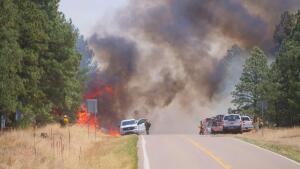The Department of Veterans Affairs headquarters is a block from the White House in Washington, DC. Chip Somodevilla/Getty Images hide caption
News
Cuts to support staff at the Food and Drug Administration are shifting work to the agency's inspectors. Stefani Reynolds/Bloomberg via Getty Images hide caption
Men repair the brakes on a truck in the parking lot of an auto parts store in Middletown, Ohio, in 2024. Prices of car parts, car repairs and car insurance are expected to rise if tariffs remain in place. Scott Olson/Getty Images North America hide caption
Mike Huckabee, recently confirmed as U.S. ambassador to Israel, places a note given to him from President Trump in the cracks of the Western Wall, during Huckabee's visit to the holy site in the old city of Jerusalem on April 18. Gil Cohen-Magen/AFP via Getty Images hide caption
The entrance of the Social Security Administration's main campus in Woodlawn, Md. Kayla Bartkowski/Getty Images hide caption
Jennifer Vasquez Sura, the wife of Kilmar Abrego Garcia, who was mistakenly deported to El Salvador, speaks to the media before she enters federal court on April 15, 2025 in Greenbelt, Md. Tasos Katopodis/Getty Images hide caption
US Senator Visits Abrego Garcia, Florida State University Shooting, Fed Independence
Secretary of State Marco Rubio before a meeting with the French foreign minister in Paris on Thursday to discuss steps toward a ceasefire between Russia and Ukraine. Julien de Rosa/AFP via Getty Images hide caption
U.S. will walk away from Ukraine peace efforts if progress not made soon, Rubio says
Oliver Ekman-Larsson of the Florida Panthers celebrates with the Stanley Cup following their victory over the Edmonton Oilers in Game Seven of the 2024 NHL Stanley Cup Final on June 24, 2024. The 2025 playoffs begin Saturday with hopes of an equally thrilling ending. Bruce Bennett/Getty Images hide caption
Many over-the-counter pain medications are available, but are they all the same? And how much should you really take? Photo illustration by Beck Harlan/NPR hide caption
President Trump arrives for a presentation ceremony for the Commander-in-Chief Trophy to the U.S. Naval Academy in the East Room of the White House on Tuesday. Win McNamee/Getty Images hide caption
The State Department releases the Country Reports on Human Rights Practices annually. Nicholas Kamm/Getty Images hide caption
The State Department is changing its mind about what it calls human rights
John Cena addresses the crowd during Monday Night RAW at The OVO Hydro on March 24 in Glasgow, Scotland. Georgiana Dallas/WWE via Getty Images hide caption
Wrestler and actor John Cena could become the WWE’s most decorated world champion
Luigi Mangione, suspect in the killing of UnitedHealthcare CEO Brian Thompson, was indicted on four federal counts. In December, he was escorted by members of the NYPD following his extradition to New York. Spencer Platt/Getty Images hide caption
The Trump administration is halting an offshore wind project in New York. Energy experts worry that the U.S. will fall behind other countries with booming offshore wind, like the United Kingdom. Christopher Furlong/Getty Images hide caption
A wind project is stalled in New York. Experts worry about impacts across the U.S.
A view of the Consumer Financial Protection Bureau headquarters building in Washington, D.C., on Feb. 10, 2025. Saul Loeb/AFP via Getty Images/AFP hide caption
The U.S. Department of Housing and Urban Development says its current staff use only half the available office space and that relocating will "reduce the burden on the American taxpayer." Mark Wilson/Getty Images hide caption
Bridge cranes load containers to a cargo ship at the Qingdao Free Trade Zone in Qingdao, Shandong province, China on April 15, 2025. CFOTO/Future Publishing/Getty Images hide caption
Raising kids is costly; Tariffs will make it even more expensive
The Hermits Peak fire approaches Highway 434 at Christmas Tree Canyon in New Mexico in 2022 Andy Lyon/Inciweb hide caption
Trump’s Forest Service cuts have people in tinder dry New Mexico on edge
Munchkin CEO Steve Dunn says tariffs will impact the availability of baby products. Frederic J. Brown/AFP via Getty Images hide caption
How tariffs could impact the availability of baby products
French President Emmanuel Macron (left) shakes hands with U.S. Secretary of State Marco Rubio next to special envoy Steve Witkoff (center) and France's foreign minister, Jean-Noël Barrot, before a meeting at the Élysée presidential palace in Paris on Thursday. Ludovic Marin/AFP via Getty Images hide caption
Jennifer Vasquez Sura, the wife of Kilmar Abrego Garcia, who was mistakenly deported to El Salvador, speaks to the media before she enters federal court on April 15, 2025 in Greenbelt, Md. Tasos Katopodis/Getty Images hide caption
Staff departures and survey cuts at the U.S. Census Bureau, headquartered in Suitland, Md., are raising questions about whether the federal agency can continue producing reliable statistics for the country. Michael Zamora/NPR hide caption
LAUSD superintendent Alberto Carvalho says he will continue to advocate for and support the hundreds of thousands of students in his district. Joe Raedle/Getty Images hide caption























